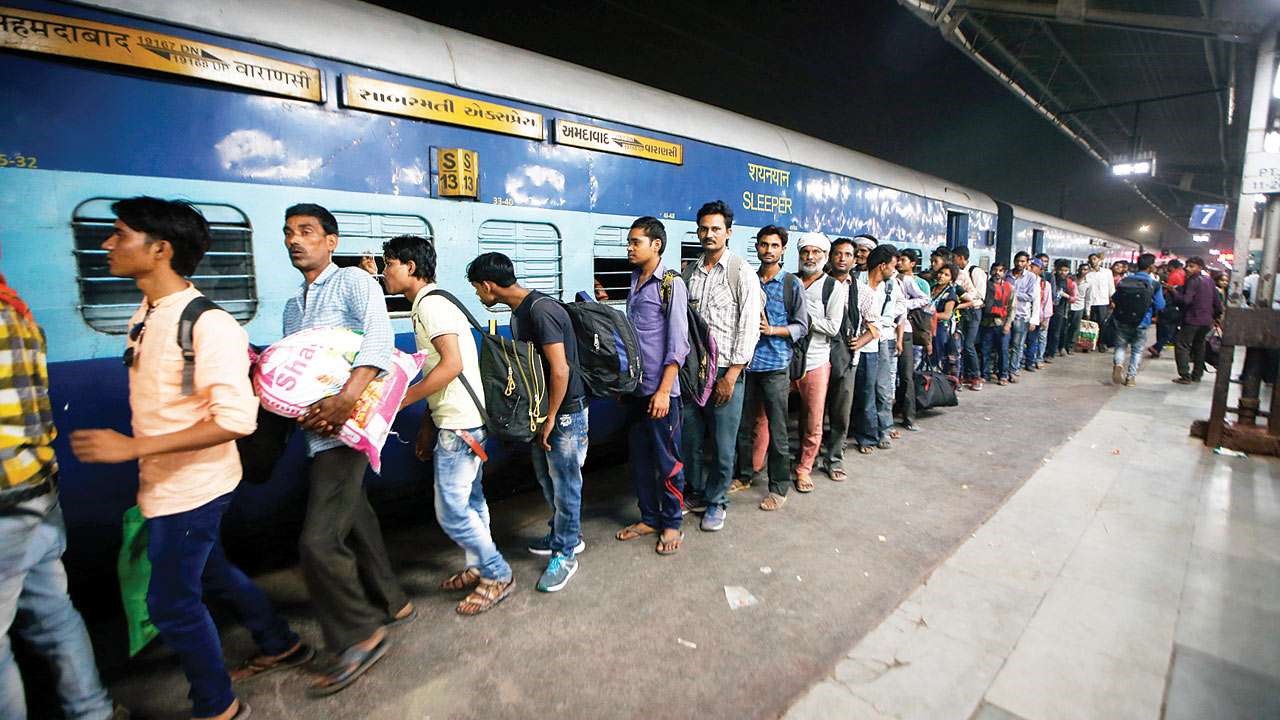Posters ask PM Modi asked to leave UP
October 11, 2018 | Expert Insights

With hundreds of migrants from Uttar Pradesh and Bihar fleeing Gujarat over the past few days, members of the UP-Bihar Ekta Manch released posters calling out Prime Minister Narendra Modi that he, too, must leave Varanasi as he is a Gujarati. These posters were seen in Sigra area of the PM’s Parliamentary constituency Varanasi.
Background
The Gujarat chief minister Vijay Rupani had constituted a law wherein 80% of jobs were given to the Gujaratis and 20% jobs to the locals from related areas. This law was formed in order to provide opportunities for the worker in terms of jobs and employment. According to the resolution passed in 1995, all the private, state and central government entities operating in the state would have to keep at least 85% reserved for the locals.
From a ‘Job-less’ to ‘Job-loss’ economy, the Indian economy is in a deep crisis. From 2011-12 to 2015-16, there has been a significant drop in the employment levels in the economy from 54% to 51%. While the working age population increased by 2.9% during this period, the number of people with jobs only increased by less than half the rate, at just 1.2% per year. It is a crisis which is engulfing even those who own the means of production. Stagnant industrial wages, dipping industrial production and low credit flow to the industry are also economic indicators that indicate the current pressing situation of the Indian economy. Many businesses have already been stung by a slowdown due to reforms like the Act of Demonetisation that contributed to extinguishing jobs in the unorganised sector. It created a job loss of close to 10.40 million jobs in 2017.
Analysis
Mukesh Patel’s factory making decorative lights sit eerily silent during what should be one of its busiest times of the year. The departure of workers in recent days is followed by the news of violence in Gujarat against migrant workers from the central states Bihar, Uttar Pradesh and Madhya Pradesh.
Small factories and businesses work have all come to a standstill in one of India’s most industrialised of its 29 states. In addition to businesses, many of Ahmedabad’s street food stalls are closed because they were mostly run by people from the three states to the east of Gujarat. According to Shyam Singh Thakur, head of the association representing migrants estimated more than 50,000 workers have fled the state since the beginning of the month.
Speaking to the media, student leader Vishwanath Kunwar said, “We love all our countrymen equally, no matter if he is from Maharashtra or Gujarat. But we also condemn the atrocities on North Indians in states like Maharashtra and Gujarat. We elected a Gujarati MP from Varanasi and we never spoke against anyone. We also demand action against the culprits indulging in violence against North Indians.”
Kunwar added, “Also, we issue an advisory to the people of Maharashtra and Gujarat to leave Varanasi in a week’s time, else they should be ready to face the consequences.
Migrant labourers, especially from Bihar, Uttar Pradesh and Madhya Pradesh, are leaving the state amid acts of violence against them after the rape of a 14-month-old girl on September 28 allegedly by a migrant worker.
The Canadian economy unexpectedly shed jobs last month, putting a dent on the confidence that policymakers have been expressing in recent weeks over the country’s growth outlook. The unemployment rate was unchanged at 5.8% while the country lost 1,100 jobs according to the Statistics of Canada.
Assessment
Our assessment is that the core issue is jobless growth in Gujarat and in many other parts of the country, which is precipitating matters further. When there are no new jobs, there is pressure on the industry to employ local people who may not have the right training. The police have been maintaining a tacit silence as their sympathies are with the local people. The decision of the Gujarat government to reserve 80 per cent of the jobs for Gujaratis is a severe blow to workers who have made a career in one of the more industrialised states in the country.
We feel that it is going to be extremely difficult to tackle the crisis of joblessness in the country and the situation does not look promising in the coming twelve months. We also feel that though this problem is not only confined to India but to many countries around the world, emerging economies like India having a young working population might lose the demographic advantage and in turn, this could lead to a demographic catastrophy.








Comments